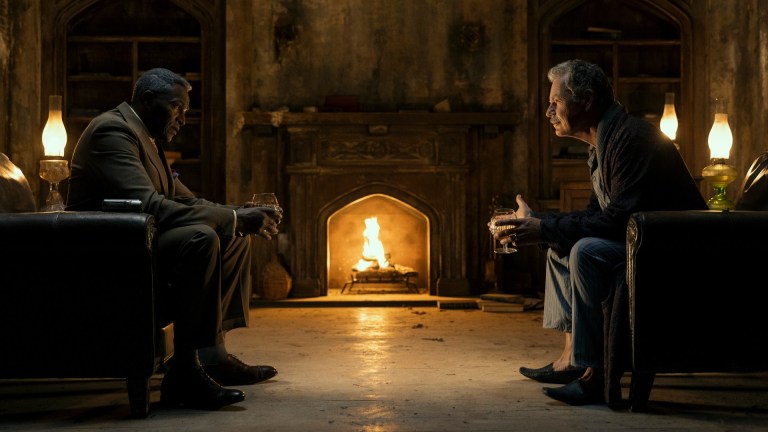The Fall of the House of Usher Has Precisely One Good Monologue
Mike Flanagan's monologue fascination turns up a banger in The Fall of the House of Usher.

Acclaimed horror filmmaker Mike Flanagan wears his influences on his sleeve. Based on his prolific output of TV shows and films, Flanagan clearly loves: Stephen King (having directed Gerald’s Game, Doctor Sleep, and the upcoming The Life of Chuck for Prime Video), classic horror literature (including the works of Shirley Jackson, Henry James, and Edgar Allan Poe), and most touchingly, his wife Kate Siegel (who has appeared in nearly every Flanagan project thus far).
Real Flana-heads know, however, that there’s one other thing the writer-director can’t get enough of: monologues. Oh, the monologues! Flanagan’s suite of Netflix series, including The Haunting of Hill House, The Haunting of Bly Manor, Midnight Mass, and most recently The Fall of the House of Usher have all been shockingly chatty endeavors. Though the horror maestro excels at conjuring dread with his camera work alone, Flanagan can’t seem to help himself from crafting bespoke, discursive diatribes around all the creepiness.
On the one hand, this is quite charming as Flanagan clearly loves watching his recurring crew of talented actors work at their craft. Also, many of the monologues are educational, flexing the writer’s arcane knowledge surely gleaned from many Wikipedia deep dives. On the other hand though…people just don’t talk like that, Mike! Witness this scene from Midnight Mass, in which Sheriff Hassan (Rahul Kohli) responds to the news that vampires might exist with a deeply personal recollection about 9/11 for five minutes.
Guys, focus. The vampires!
The monologues continue apace in Flanagan’s latest (and likely final) series for Netflix: The Fall of the House of Usher. While the eight episodes of this show present a pleasantly nasty modern interpretation of the works of Edgar Allan Poe, they also feature characters frequently droning on about one thing or another. Monologues in Usher include several tortured backstories, an anecdote about a car, and even a meditation on how the ancient Greeks started experiments on animals in 4th century BCE. They’re all pretty boring. Save for one.
There’s one monologue in The Fall of the House of Usher that’s so compelling it reminds you of why Flanagan loves to write them for his actors in the first place. The moment comes midway through episode 3 “Murder in the Rue Morgue,” in which C. Auguste Dupin (Carl Lumbly) alludes to the cliche of “making lemonade out of lemons.” His conversation partner, the evil Pharma CEO Roderick Usher (Bruce Greenwood) has quite a lot to say about that. The full monologue follows, as transcribed by user “bfeebabes” on Reddit:
“When life hands you lemons, make lemonade? No. First you roll out a multi-media campaign to convince people lemons are incredibly scarce, which only works if you stockpile lemons, control the supply, then a media blitz. Lemon is the only way to say ‘I love you,’ the must-have accessory for engagements or anniversaries. Roses are out, lemons are in. Billboards that say she won’t have sex with you unless you got lemons. You cut De Beers in on it. Limited edition lemon bracelets, yellow diamonds called lemon drops. You get Apple to call their new operating system OS-Lemón. A little accent over the ‘o.’ You charge 40% more for organic lemons, 50% more for conflict-free lemons. You pack the Capitol with lemon lobbyists, you get a Kardashian to suck a lemon wedge in a leaked sex tape. Timotheé Chalamet wears lemon shoes at Cannes. Get a hashtag campaign. Something isn’t ‘cool’ or ‘tight” or ‘awesome,’ no, it’s ‘lemon.’ ‘Did you see that movie? Did you see that concert? It was effing lemon.’ Billie Eilish, ‘OMG, hashtag… lemon.’ You get Dr. Oz to recommend four lemons a day and a lemon suppository supplement to get rid of toxins ‘cause there’s nothing scarier than toxins. Then you patent the seeds. You write a line of genetic code that makes the lemons look just a little more like tits… and you get a gene patent for the tit-lemon DNA sequence, you cross-pollinate… you get those seeds circulating in the wild, and then you sue the farmer for copyright infringement when that genetic code shows up on their land. Sit back, rake in the millions, and then, when you’re done, and you’ve sold your lem-pire for a few billion dollars, then, and only then, you make some fucking lemonade.”
This lengthy lemon lesson works on a couple of levels. For starters, it’s just clever. Aside from some dated references (Kim Kardashian’s leaked sex tape is old enough to drive by now), Roderick’s vision of engineering a citrus-obsessed world is quite smart. More importantly, however, this is the most compelling example the show ever presents of the Usher family’s ruthless competence in building their evil empire.
For much of The Fall of the House of Usher, Roderick is too preoccupied with burying his dead children to display any real business acumen. The best he can do as it all falls apart is to chat with some board members on the phone. Here though, we see a glimpse of the cynical mind that can create a devastating opioid epidemic from nothing.
“Show don’t tell” is a good storytelling maxim in general. But when a character can deliver a monologue this creative, telling works just fine.
All eight episodes of The Fall of the House of Usher are available to stream on Netflix now.
